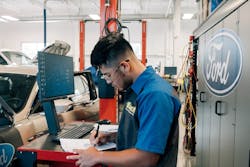It’s no secret the automotive aftermarket is facing a unique, and oftentimes difficult, transition into the future.
As more OEMs commit to all-electric futures, independent shops are left trying to figure out the balance of servicing the vehicles they have coming into their shops now and the ones that, though they are currently scarce now, will be increasingly popular over the next several decades.
Adding on to that pressure is a lack of information and a lack of people who know how to use it.
The Right to Repair battle continues to take place in state legislatures across the country, and if the recent saga in Massachusetts is any indication, OEMs will fight tooth and nail to keep their telematic data and repair procedures private.
Combine that with the ongoing tech shortage, and the aftermarket is facing a tough transition to an inevitably electric future.
"The lack of trained technicians is about to become an international crisis," says Ruth Morrison, chair of the automotive technology department at Southern Maine Community College. "There are a lot of electric and hybrid vehicles being produced, and we don't have enough people who know how to work on them."
A report from the nonprofit technical student support organization Techforce suggests the automotive industry will have around 800,000 fewer technicians than it needs by the year 2025.
Morrison, who first started in the industry in 1993 and began teaching at SMCC in 2005, says training is crucial to making techs feel they have the tools they need to succeed, which in turn incentivizes them to stay.
She also acknowledges, though, that finding training programs and taking your best tech off the line to attend those programs isn’t easy.
“Certainly, if you have a technician who's turning hours and making a profit for the company, it's hard to slow them down and train them on the job,” she says.
That’s a problem Morrison has seen for decades now and is something she has been trying to solve for as long as she’s been at SMCC.
In 2009, Morrison approached her advisory committee to start an EV curriculum, but at the time there wasn’t a lot of support for it. As EVs have become increasingly prominent over the last few years, though, the tune of the advisory board changed pretty quickly.
“In summer of 2019, I was approached and asked to develop and teach a class in electric vehicles, so they did a big turnaround in 10 years,” she says.
The program that Morrison developed gives students hands-on experience working with electric vehicles and hybrids. According to a news release sent out by the school when the program first launched in December 2021, students will have to do 32 hours of online instruction before completing a week-long, hands-on course in the school's Automotive Technology Center.
The first offering of the course provided hands-on instruction on a Toyota Prius hybrid since Morrison says that is one of the most prominent PHEVs on the roads, though the technical knowledge gained is applicable to most electric vehicles.
“They’re using the equipment, learning how the different diagnostic tools work, doing the service and making the predictions for the state of the vehicles, what kind of condition they were in,” Morrison says.
The course is being offered to technicians currently in the field as the college works out the curriculum for matriculated students, which Morrison says is giving techs a unique opportunity to re-evaluate how they look at and repair electric vehicles.
“They're coming in from their jobs, doing this training and then going back to their job site,” Morrison says. “This is more about diagnosing and repairing EV components rather than just replacing them.”
As electric vehicles become more prominent, more programs such as Morrison’s are popping up across the country. Community colleges such as Heartland Community College in Illinois, Evergreen Valley College in San Jose, California, and others are beginning to offer EV certification courses, and industry institutions such as Worldpac, UTI and I-CAR are also developing curriculum specific to electric and hybrid vehicles.
And like the SMCC program, many are designed to get techs in and out as quickly as possible with the skills they need to thrive in a shifting automotive landscape.
Finding an EV repair program at a local school or through an industry organization for your techs, Morrison says, could provide your shop a big leg up over dealerships in the long-run.
“A lot of dealerships are just replacing entire units rather than repairing them, and that's going to be a higher cost to customers,” Morrison says. “Now that we have so many vehicles that are beyond warranty and maybe being sold to a second owner or a third owner, those customers are probably going to want to have reduced costs when they go to repair their vehicle.”
Though that will take some investment, Morrison says it’s worth it.
"I think that there's a great opportunity for a lot of customers and a lot of business. There's certainly enough vehicles on the road that need service, and those are services that can be offered by independent shops,” she says.
About the Author

Noah Brown
Noah Brown is a freelance writer based in St. Paul, Minnesota. He has covered the automotive aftermarket and vehicle technology sector since 2021.
